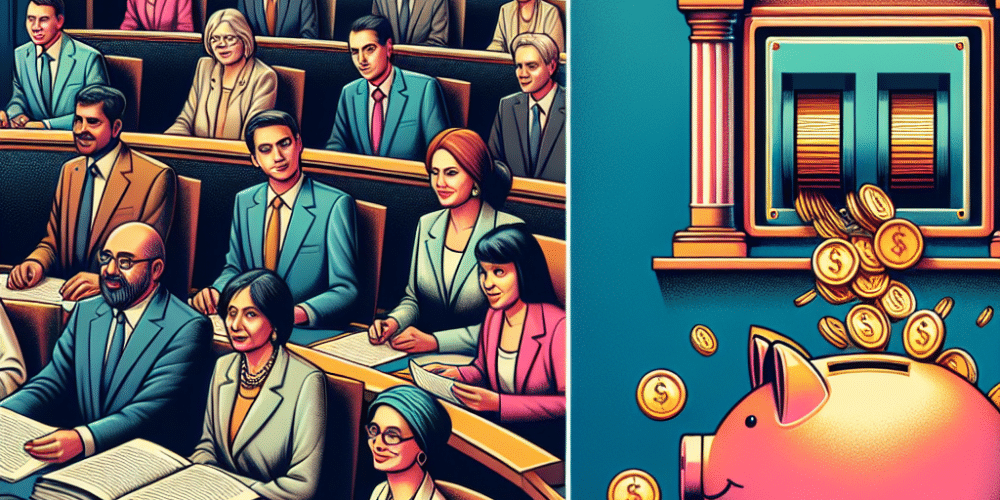In the UK, a significant number of Labour MPs are advocating for a rise in gambling taxes with the intention of redirecting the proceeds to enhance child benefits. This move, driven by former chancellor Gordon Brown, aims to dismantle the existing two-child benefit cap.
Nearly half of Labour’s backbenchers have shown support for this initiative. According to reports from ITV, the proposal has garnered backing from 101 Labour MPs, alongside members of the All-Party Parliamentary Group, Alex Ballinger and Beccy Cooper. The proposed tax increase on gambling is intended to raise funds to eliminate the two-child benefit restriction, reflecting the concerns of approximately half of the 235 Labour backbenchers.
Proponents of the tax increase argue that the gambling sector, despite its rapid expansion, contributes minimally to the UK economy. They point out that many gambling companies employ smaller workforces and often operate from foreign markets to reduce their UK tax liabilities.
The letter to Chancellor Rachel Reeves emphasized recommendations from the Institute for Public Policy Research (IPPR). The recommendations include raising the tax on online slots, poker, and bingo from the current rate of 21% to 50%, and increasing the machine games duty on cash-prize slots and general betting duty on sports betting from 20% and 15% to 50% and 30%, respectively.
In essence, the proposal suggests more than doubling the UK’s gaming taxes, which the IPPR estimates could generate an additional £3.2 billion ($4.3 billion) in tax revenue.
Supporters believe that this additional funding would enable the removal of both the two-child benefit cap and the household benefit cap. They argue that such changes could elevate half a million children out of poverty, presenting a compelling case for the tax hikes.
In the letter addressed to Reeves, Ballinger stressed, “No child should be growing up in poverty while gambling companies continue to enjoy profits.” He also highlighted the societal costs associated with gambling, which reportedly amount to £1 billion annually in the UK.
Rachel Reeves, in her conversation with ITV, mentioned that the proposed changes are “on the table.” She indicated that she did not require MPs or former chancellors to prompt her to launch an inquiry into gambling taxation, as she had already planned to address this in her upcoming budget on November 26.
Previously, Reeves suggested the idea of aligning the UK’s gambling tax to create a single, unified rate. However, this proposal met with resistance from various industry stakeholders. The British Horseracing Authority expressed concerns that such changes could negatively impact one of Britain’s most cherished sports.
In contrast, the Betting and Gaming Council (BGC) continues to resist any proposals for increasing gambling taxes, arguing that such measures would be detrimental. They claim that higher taxes could weaken the legal market, embolden the black market, and potentially lead to job losses.
From the perspective of the gambling industry, the argument stands that increased taxation could threaten the sector’s stability. The BGC warns that the consequences of higher taxes might extend beyond financial strain, potentially impacting employment and prompting a shift towards unregulated markets. This perspective highlights the delicate balance between regulation and industry viability.
Yet, advocates for the tax increase maintain that the potential social benefits outweigh the risks. They underscore the urgency of addressing child poverty and argue that the gambling industry, with its substantial profits, should contribute more significantly to societal well-being.
The debate brings to light the broader issue of tax policy and its implications for both social equity and economic vitality. On one hand, there is a pressing need to address social inequalities and provide adequate support for families. On the other, there is a legitimate concern about preserving the competitiveness and sustainability of the gambling industry, which employs thousands and contributes to the entertainment landscape.
As discussions unfold, the proposal to increase gambling taxes stands at the intersection of economic policy and social responsibility. The government, industry stakeholders, and the public are engaged in a complex dialogue about how to equitably share the proceeds of a thriving industry while safeguarding vulnerable populations.
This situation underscores the challenges faced by policymakers in balancing economic growth with social welfare. The outcome of this debate will likely have far-reaching implications, not only for the gambling sector but for the broader landscape of UK fiscal policy. As the November budget announcement approaches, all eyes will be on Chancellor Reeves and the direction she chooses to take on this contentious issue.

David Garato is a luminary in gaming journalism, renowned for peeling back the curtain on the gaming world with his witty and insightful commentary. A decade into weaving stories from the pixelated edges of indie games to the expansive universes of AAA titles, David’s work is a thrilling blend of analysis and adventure. When not writing, he’s live-streaming, sharing his gaming exploits with an engaged and growing audience. David doesn’t just write about games; he lives them, making him a trusted guide in the gaming community.
















